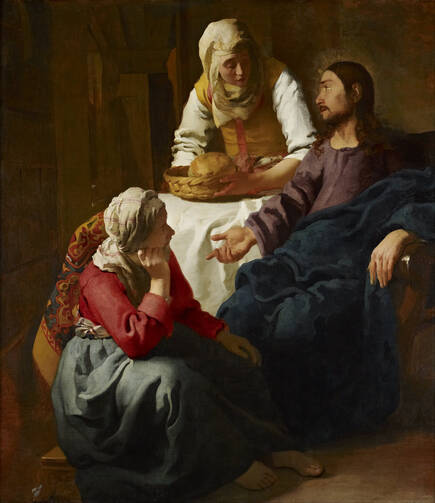Gospel: One Necessary Thing
Martha was made for our time: busy with many things, seeking to be recognized and also, it must be said, trying to do her best. We meet her in Luke’s Gospel when Jesus comes to visit the two sisters, Mary and Martha, in their home. Mary sat at Jesus’ feet and “listened to his word,” while Martha was distracted by “much service.” Indeed, Martha was so distracted by her own work that she complained that her sister was not helping her, a complaint that rings true in our own day as well. But Jesus does not take up her cause; instead he challenges Martha by pointing out that she is “worried” and “distracted” by her service. Jesus says that only “one thing is necessary” and that Mary has chosen the “better portion.”
Martha is by no means a negative figure, as hospitality is an essential gift to others, but she is a slightly harried figure. Martha’s troubles stem not from the service she renders but from her desire to be acknowledged for it, a concern that rings true more than ever in our social media age; and these worries and distractions are keeping her from offering herself freely to Jesus and from being present to the Messiah in her midst. Jesus says that “one thing is necessary,” and this is to find Christ in our midst and to be with him, as Mary was.
How will we find Christ in our midst if we do not slow down? How will we find Jesus’ face in the stranger if our service, even our good service, is done in order to serve our needs? How do we find Christ in “the least of these” if our focus is on ourselves? We all have the potential to be Mary, but our age, for all of its great gifts, makes it hard to be the one who quiets down and listens.
We can now worry about every corner of the world as we scroll through our Twitter feeds or Facebook pages. We can worry about the world around us without being present to those with us. This anxiety can foster a sense of meaninglessness or helplessness. This worry and anxiety, though, is paired with the constant distractedness of daily life.
People are too busy even to take vacations or get enough sleep, since there is so much work to do and, positively, “more service” to do. Yet even leisure, the simple relaxation of watching an episode of a TV series, might not be enough to stave off distraction today, as I cannot watch TV without my smartphone open so I can find out what everyone else is thinking about “The Americans” or “Game of Thrones” or just surfing the web to see what else might catch my attention. Distractedness is a sign of our electronic connectedness and our human disconnectedness. We yearn for deep relationship, as Mary had with Jesus, but this requires putting away the tools and mind-set of anxiety and distraction.
It is not that Martha is doing anything wrong in showing hospitality, or that we are doing anything wrong in trying to do a lot of things; it is that we can do better. And it is not just that we need to challenge the busyness of our daily lives and to relax—we do—but it is that there is something better waiting for us. The good news is that Jesus wants us to be with him.
With Jesus we are not judged by how much we can accomplish, but we are accepted for who we are. Jesus asks us to spend time with him. Our worth is not dependent upon what we can do but upon who we are: beloved friends of Jesus, who calls us to be with him and love him. In that context, we can be prepared to serve our friends and others, do our work and show hospitality, not because we want to be acknowledged and rewarded but because we love others and love God.
What a remarkable reality. The more we love others, care for others, not out of worriedness or distractedness, but out of love, the more we are at ease with others and ourselves. We are not doing for, we are being with. It is the heart of the one necessary thing: being present to Jesus in order to love others.
This article also appeared in print, under the headline “One Necessary Thing,” in the July 4-11, 2016, issue.








